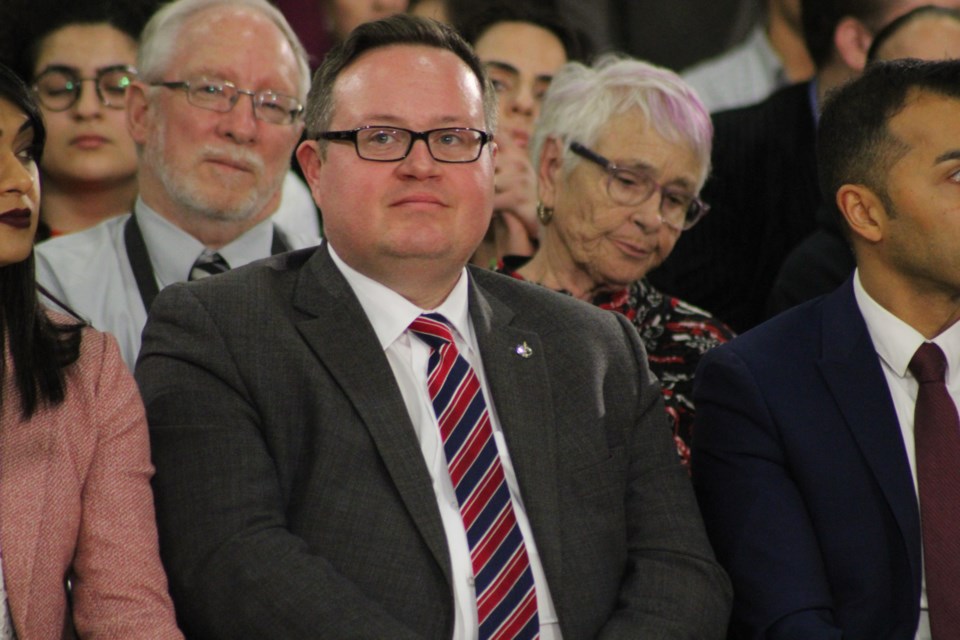On the day Canada approved the purchase of 88 new fighter jets, a local elected official is defending the move, saying Canada may have to defend its borders sooner than we think.
After weeks of speculation, Canada's Defence Minister Anita Anand said at a Monday press conference that Canada had agreed to the $19 billion purchase of F-35 planes from the United States and Lockheed Martin. The first 16 planes will be arriving in the next few years to replace the aging CF-18 fleet the country’s Air Force is currently using.
“The F-35 advanced fighter aircraft fleet will ensure that our aviators have the long-term ability to defend the second-largest airspace in the world,” Anand said.
Cambridge MP Bryan May works closely with Anand as her parliamentary secretary and said recent geopolitical tensions have certainly made the upgrades more urgent.
“As recent events in Ukraine have shown us, Canada needs to be able to defend itself,” May told CambridgeToday in an emailed statement. “This is especially true as the Arctic opens up and reveals some of the richest deposits of mineral resources in the world and the Northwest Passage has a strong potential to become a preferred trade route. We need to be able to enforce our sovereignty here.”
May calls the fighter fleet “just one piece of the puzzle,” as Canada requires a military that is flexible, agile, and capable of responding to a variety of unforeseen situations in a turbulent geopolitical environment.
The Canadian government has put plans in motion to upgrade the over 40-year-old CF-18 fleet several years ago, but as recent events have shown, the time for advancements is now, he adds.
The Arctic has become contentious ground for Canadians against Russia and China.
In October 2022, Gen. Wayne Eyre, the chief of the defense staff, spoke in front of the House of Commons defense committee and explained the challenge Canada might face in the coming future.
"Right now, today, we don't see a clear and present threat to our sovereignty, not today, not this week, not next week, not next year," Eyre said. "However, in the decades to come, that threat, that tenuous hold that we have on our sovereignty, at the extremities of this nation, is going to come under increasing challenge."
May shares the same sentiment as Eyre and agrees Canada needs to invest in equipment and strategies that are going to last for decades.
“Canada must continue to be ready to defend itself and be able to contribute meaningfully to joint efforts with our allies,” May says in his email. “We must be able to protect the sovereignty of one of the largest expanses of coasts, land and airspace in the world.”
On Jan. 6, a small gathering of protesters outside of May’s office on Hespeler Road in Cambridge argued that the Canadian government should not be spending billions of dollars on military upgrades, but instead support Canadians here at home to address social issues and climate change.
“We should be funding climate action, social programs and helping those in need,” said protest organizer Tamara Lorincz. “We have a climate crisis on our hands and we could be spending our money in better places.”
The protesters spoke with the MP’s staff at the office and talked about Canada’s role in global affairs and heard their concerns about “irresponsible spending,” Lorincz added.
May, who was unable to respond to a request for comment during Friday's protest, is familiar with the protesters and called their demonstration a fairly regular occurrence.
“They see the conflict in Ukraine as an example of NATO aggression against Russia,” said May.
“According to this group, virtually every western-involved conflict in recent history, including the peacekeeping operations to stop genocide in the Balkans in the 1990s, is a NATO aggression against powers such as Russia and China. I respectfully disagree.”
May has heard the arguments that they should spend the money on social programs, but points out the amount of money being spent on housing and other social programs dwarfs what is being spent on these jets.
“We are not compromising what we spend on social programs in any way. The National Housing Strategy alone is easily ten times what we are spending on the F-35 jets,” noted May.
The Cambridge MP and the Canadian government are committed to enhancing technology that defends Canada and keeps them on top of the global food chain.
“Weapons have to be able to attack what is attacking you in order to defend. This does not mean they are being used for aggression,” May added. “It is a poor choice to divest ourselves of all weapons that are capable of resisting a potential invader or aggressor, simply because they can be used for offensive purposes as well.”
May said this project will provide significant and long-standing economic investments into communities from coast-to-coast. Nearly USD $3 billion has been awarded in contracts to Canadian aerospace companies to help engineer new technologies for these planes.

